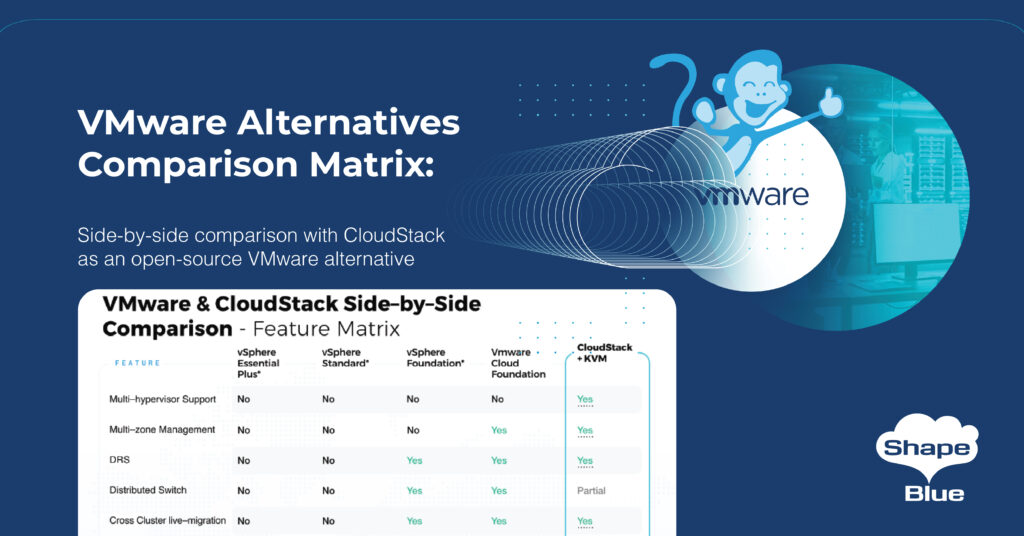Is the virtualization landscape shifting beneath our feet? Recent market dynamics, particularly Broadcom's acquisition of VMware, have undeniably thrown the spotlight on alternatives, prompting a critical reevaluation of virtualization strategies for businesses of all sizes.
The quest for viable alternatives to VMware has intensified, fueled by concerns regarding rising costs, evolving licensing models, and a desire for solutions that better align with specific business needs. Long-time users, accustomed to the functionalities of vSphere, are now weighing their options, seeking solutions that offer comparable features, enhanced flexibility, and competitive pricing.
Many organizations are actively exploring alternatives for their private cloud solutions, while others are looking for solutions that can integrate with Azure, or utilize open source technology. The current market suggests a need for versatility and flexibility. This shift underscores the importance of carefully evaluating different virtualization platforms, taking into account the unique requirements, goals, and budget constraints of each organization.
Heres a glimpse into the key players and some important considerations, keeping in mind that VMware, once a dominant force, is now facing increased competition and scrutiny.
One of the immediate contenders in this evolving landscape is Microsoft's Hyper-V. Its a direct competitor that often benefits from its seamless integration with the Windows Server environment. This built-in synergy offers native integration and support for Windows workloads, making it a natural choice for organizations deeply invested in the Microsoft ecosystem.
As a type 1 hypervisor, Hyper-V offers similar virtualization capabilities as VMware, making it a strong contender, especially for organizations that have already invested in Microsoft's ecosystem. It is often bundled with Windows Server at no additional cost, providing native integration and support for Windows workloads. This can be a significant cost-saving advantage for businesses.
- Vegamovies Nl 2025 Your Guide To Free Streaming 4k Movies
- Uncensored Anya Matusevich More Exclusive Content 2024
Beyond Hyper-V, the realm of VMware alternatives is rich and diverse. Exploring this landscape, we can uncover notable alternatives, each offering unique features and advantages. Choosing a VMware alternative depends not only on an organizations size but also on its specific needs, goals, and budget.
VirtualBox, a popular open-source solution, is another contender. VirtualBox and its counterparts create virtual versions of physical computers, networks, or storage devices. Depending on the chosen solution, the method of creating and managing virtual systems may differ in their functionality, ease of use, and included features.
Other notable contenders include Nutanix, Proxmox, Scale Computing, OpenStack, and Red Hat OpenShift. These platforms bring their unique strengths to the table. The ideal choice balances scalability, flexibility, and cost-effectiveness, ensuring the solution can meet evolving business needs.
The Broadcom acquisition of VMware has undeniably sparked a mass exodus of customers seeking cheaper and more flexible solutions. The best alternatives to VMware in 2025 will be those that offer excellent scalability and flexibility. The key considerations should include the ability to tweak as needs change, so that organizations can stay agile. This means carefully assessing the features, pricing, and user experience of each platform.
VMware, like many providers, tends to calculate final license prices individually for each client, which is something that the alternatives aim to address. The rise in VMware costs, without a corresponding increase in value, is causing many IT professionals to reconsider their dependency on the platform. The alternatives provide a chance for businesses to reduce costs and improve efficiency.
When choosing an alternative, it is essential to compare the features, benefits, and drawbacks of each option. The best VMware workstation player alternatives are VirtualBox, QEMU, and VMware Workstation Pro. Exploring an open-source alternative to VMware may be a good option. There are many software solutions, and the suitability of an alternative depends heavily on individual requirements.
Kubernetes is emerging as a significant player, presenting a real challenge to vSphere. The changing technology is shifting the balance, and users can now create virtual versions of physical computers, networks, or storage devices with a wide variety of options.
If the goal is more Azure-integrated services and management, then Azure Local is likely the best alternative.
The following table offers a comparative look at some of the leading VMware alternatives:
| Feature | Hyper-V | VirtualBox | Proxmox VE | Nutanix AHV | OpenStack |
|---|---|---|---|---|---|
| Type | Type 1 Hypervisor | Type 2 Hypervisor | Type 1 Hypervisor | Type 1 Hypervisor | Cloud Operating System |
| Integration | Windows Server Ecosystem | Cross-Platform | Debian/Ubuntu based | Nutanix Enterprise Cloud | Highly Customizable |
| Licensing | Included with Windows Server | Open Source | Open Source | Commercial, included with Nutanix | Open Source |
| Ease of Use | Generally easy, especially for Windows admins | User-friendly, good for beginners | GUI-based, relatively easy | Simplified Management | Complex setup, requires expertise |
| Scalability | Good, scales with Windows Server | Limited, best for small environments | Good, supports clustering | Highly Scalable | Highly Scalable, cloud-ready |
| Notable Features | Live Migration, Replication | Snapshotting, Cross-Platform Support | HA, Live Migration, ZFS support | Integrated Management, Automation | Open API, Modular Design |
When considering VMware alternatives, understanding the advantages and disadvantages of each platform is critical. Factors like ease of use, scalability, integration capabilities, and, of course, licensing costs should all be assessed.
The future of virtualization is likely to be a hybrid one, where organizations combine on-premise solutions with cloud-based services. It is important to assess how each alternative integrates with cloud services.
As the industry evolves, the key is to remain flexible and adaptable. The market is saturated with options and the need to change is constant. The best choice will reflect individual requirements and give the business the best chance of success.
The current landscape offers numerous opportunities for organizations to optimize their virtualization strategies. The most successful strategy will be the one that focuses on a comprehensive evaluation and a forward-thinking approach. If VMware's future feels uncertain, the path forward is clear, and alternatives are ready to be explored.
- Ecryptobitcom Tokens Key Features Benefits For 2024 Beyond
- Best Guide To Understanding Aagmal 2024 Tips Tricks


